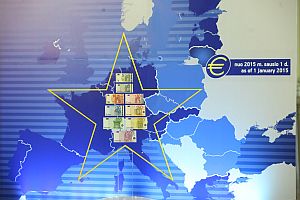Analytics, Banks, EU – Baltic States, Financial Services, Legislation, Lithuania
International Internet Magazine. Baltic States news & analytics
Tuesday, 03.03.2026, 23:26
EU Commission: Lithuania well prepared for euro
 Print version
Print version |
|---|
The Lithuanian Mint has started minting 370 million euro coins featuring Vytis "the Chaser", an armoured knight on horseback represented on Lithuania's coat of arms. 132 million euro banknotes of various denominations have been borrowed from Deutsche Bundesbank.
The Lithuanian central bank, the Bank of Lithuania, started to provide commercial banks with euro coins and euro banknotes on 1 October and 1 November 2014 respectively, the EC said.
Until 15 January 2015, Lithuanian litas and euros will circulate in parallel. Retailers will have a particularly important role to play as "de facto exchange offices" during this period.
In order to address consumers' concerns about price increases and abusive practices during the changeover period, a campaign called the Memorandum on Good Business Practice upon the Introduction of the Euro was launched in August. By signing the Memorandum, businesses commit that they will not to use the adoption of the euro as a pretext for increasing prices of goods and services.
The communication campaign has intensified during the autumn under the guidance of the Ministry of Finance and the Bank of Lithuania. It focuses on practical aspects of the euro's introduction, in line with the needs expressed by the Lithuanian population in the Flash Eurobarometer survey on Lithuania. In order to have a smooth transition as other countries that have recently adopted the euro, the Lithuanian authorities should continue to address the remaining concerns related to the euro's introduction and to increase consumers' confidence, the EC said.
It is only a few weeks to go until Lithuanians start using euros to pay for everyday transactions in their country. On 1 January 2015, Lithuania will become the 19th member of the euro area, which will then encompass all three Baltic States.
Since 2004, the European Commission (EC) has commissioned Eurobarometer surveys in the countries which have yet to adopt the euro in order to gauge citizens' attitudes towards and knowledge about the introduction of the euro, the EC reports.
In order to better follow the evolution in citizens' attitudes towards and knowledge about the introduction of the euro in the context of the euro changeover, the European Commission decided to commission a second dedicated survey in Lithuania. The fieldwork for this survey was carried out from 4 to 6 September of 2014.
The latest survey shows that the support for euro adoption is stable. 48% (+1 pp) are in favour of the introduction of the euro. A majority of respondents (51%) think that Lithuania is ready to adopt the euro.
When asked about consequences of the introduction of the euro, the number of Lithuanians expecting positive consequences has increased at all levels. While 50% (+5pp) now see positive consequences for current euro area Member States, 44% (+3pp) expect positive consequences for their own country and 37% (+2pp) on a personal level.
As regards possible consequences of the euro introduction on prices, the survey clearly highlights that a negative impact is still a major concern for the Lithuanians with 84% (+ 9pp) expecting prices to go up and only 11% (-7pp) expecting the euro to keep prices stable. Furthermore, 76% (+6pp) express concerns about abusive price setting during the changeover
The level of public awareness on euro changeover related issues continues to increase, with 70% (+20pp) of Lithuanians considering themselves to be well-informed. Furthermore, 96% of respondents know that the day of euro adoption is 1 January of 2015 (+14pp).








 «The Baltic Course» Is Sold and Stays in Business!
«The Baltic Course» Is Sold and Stays in Business!

